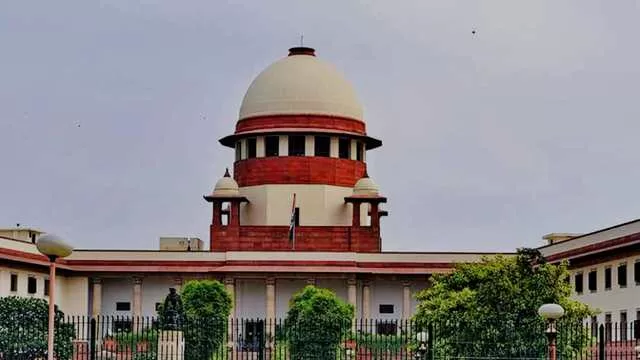In a landmark decision on Wednesday, the Supreme Court of India ruled that divorced Muslim women are entitled to seek maintenance from their husbands under Section 125 of the Criminal Procedure Code (CrPC). This ruling emphasizes that the secular law takes precedence over the Muslim Women (Protection of Rights on Divorce) Act, 1986, ensuring broader protection for women’s rights.
The Ruling: Upholding Women’s Rights
A bench comprising Justices BV Nagarathna and Augustine George Masih delivered the judgment, which reaffirmed the right of a Muslim woman to claim maintenance from her ex-husband under Section 125 of the CrPC. This decision came while hearing a petition by a Muslim man challenging a Telangana High Court order directing him to pay interim maintenance to his ex-wife.
Justice Nagarathna, while pronouncing the verdict, stated, “Section 125 CrPC is applicable to all women, not just married women.” This ruling dismisses the notion that the Muslim Women (Protection of Rights on Divorce) Act, 1986, could limit a divorced Muslim woman’s right to seek maintenance under the CrPC.
The Case: Mohd Abdul Samad vs State of Telangana
The case that led to this significant ruling is ‘Mohd Abdul Samad vs State of Telangana and another.’ The petitioner, Mohd Abdul Samad, raised grievances over being directed to pay maintenance to his ex-wife, from whom he had divorced in 2017. Initially, a family court had ordered Samad to pay ₹20,000 per month as interim maintenance.
Samad challenged this order in the Telangana High Court, arguing that under Muslim personal law and the Muslim Women (Protection of Rights on Divorce) Act, 1986, his ex-wife was not entitled to maintenance under Section 125 CrPC. The High Court subsequently reduced the maintenance amount to ₹10,000 per month.
Unhappy with this decision, Samad approached the Supreme Court, seeking relief from the maintenance order. However, the Supreme Court upheld the High Court’s directive, reinforcing that the CrPC’s provisions for maintenance apply universally, regardless of personal laws.
The Implications of the Verdict
This Supreme Court judgment marks a pivotal moment in the interpretation of maintenance laws concerning divorced Muslim women in India. By affirming that Section 125 CrPC overrides the Muslim Women (Protection of Rights on Divorce) Act, 1986, the Court has ensured that divorced Muslim women have the same legal recourse for maintenance as women of other religions.
The ruling also clarifies that if a Muslim woman gets divorced while an application under Section 125 CrPC is pending, she can still seek maintenance under the Muslim Women (Protection of Rights on Marriage) Act, 2019. This provides a dual layer of protection, ensuring that divorced Muslim women are not left without financial support.
Historical Context: Maintenance Laws in India
Section 125 of the CrPC is a secular law designed to prevent vagrancy and destitution by providing a quick remedy for the supply of food, clothing, and shelter to deserted wives, children, and parents. It mandates that if any person having sufficient means neglects or refuses to maintain his wife, children, or parents, the magistrate may order such a person to make a monthly allowance for their maintenance.
The Muslim Women (Protection of Rights on Divorce) Act, 1986, was enacted in response to the Shah Bano case, where the Supreme Court had ruled in favor of granting maintenance to a divorced Muslim woman under Section 125 CrPC. The Act was perceived as limiting the maintenance rights of Muslim women, leading to controversies and debates about its implications.
Reactions to the Verdict
The Supreme Court’s ruling has been hailed as a progressive step toward gender justice. Legal experts and women’s rights activists have welcomed the decision, emphasizing that it aligns with the constitutional principles of equality and non-discrimination.
“This judgment reinforces the principle that all women, irrespective of their religion, are entitled to maintenance under the secular laws of the country,” said a senior advocate. “It’s a significant step in ensuring that divorced Muslim women are not left destitute and have access to financial support.”
Looking Forward: Ensuring Justice for All
The Supreme Court’s decision sets a precedent for future cases involving maintenance claims by divorced Muslim women. It underscores the importance of interpreting laws in a manner that promotes justice and equality, ensuring that personal laws do not undermine the rights of women.
By reaffirming the applicability of Section 125 CrPC to all women, the Court has taken a definitive step towards harmonizing personal laws with the constitutional mandate of gender equality. This ruling not only provides immediate relief to the petitioner’s ex-wife but also strengthens the legal framework protecting divorced Muslim women’s rights across India.
The Supreme Court’s ruling that divorced Muslim women can seek maintenance under Section 125 CrPC is a landmark judgment that strengthens the legal rights of women in India. By prioritizing the secular law over personal laws, the Court has ensured that all women, regardless of their religion, have equal access to justice and financial support. This decision marks a significant step forward in the fight for gender equality and women’s rights in India.

